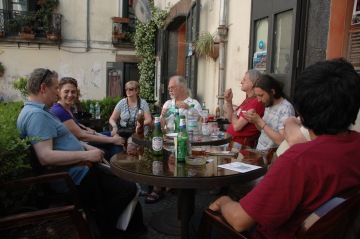


June 3, 2015, the afternoon after I arrived in Salerno, Italy, I found my way up to the Santa Sofia Complex, an old church on a square with a fountain.The first 100-Thousand Poets for Change (100TPC) World Conference would begin with an opening reception in the evening. In the complex, I met Terri Carrion, one of the co-founders of 100TPC and co-organizer of the conference. She told me that her partner, Michael Rothenberg, was around the corner at a cafe meeting one of the writers who had just arrived from Macedonia.

After helping Terri and Valeriano Forté, a Salerno poet and 100TPC organizer, assemble some tables in our meeting room, I wandered down to the cafe. Several poets gathered at tables in excited conversation. Michael was with Mitko Gogov, the poet from Macedonia. Others were from the U.S., Mexico, Hungary, Germany (via the U.S. and Rome), Greece, Malaysia, and France. And this was just the beginning. All of the people at the cafe then I now count among new-found friends, along with many more that I met during the following week.

Salerno, Italy
Imagine, if you can, more than 80 poets from all over the world—every continent, 33 countries. Imagine poets from every generation, spoken-word artists, poets with books or no book, all come together to share the spirit of poet-activists, as 100TPC organizers. Now imagine us all talking about poetry, about arts and activism, women’s issues, oral versus print traditions, and organizing—with interpreters translating into Italian and English. That’s how our four conference days were (mostly) spent.

Detail from mural in Salerno
Those were scheduled topics. Another one came up—artists’ international mobility. Several poets had their visa requests turned down by their home countries or Italy. So we rejoiced when three poets from Egypt finally received their visas at the last minute and arrived during the conference. Some who could not make it joined us virtually by posting to social media. For the next conference, we plan to be more prepared for this issue, and to have both advice and, if we can raise them, funds to assist people.

The days tended to serious dialogue on sustainability, peace and justice. The evenings (and a couple of afternoons) overflowed with poetry. Each evening, several poets read as “scheduled” readers, usually after dinner. Then came the open mic—which ranged from raucous readings to a quiet “campfire” around candles to a poetry walk from the complex to the sea. The open mic that I co-hosted with a poet living in Malaysia and a Ghanian poet was in a restaurant, the last reading of the conference.

Along a Salerno Street

And what of Salerno? Salerno won our hearts—an old city with a castle overlooking it that once was ruled by a warrior-princess; the home of Alfonso Gatto, an Italian poet whose poetry appears in murals by contemporary artists all over the town via the Alfonso Gatto Foundation (a sponsor of the conference); a town nestled between mountains of alleyways, stone walls, beautiful squares and the sea; a song of bells, sea gulls, swallows; a haven for street artists and poets.

Salerno, Italy
The night following the end of the conference, many of us still in Salerno took over most of a small restaurant around the corner from the Santa Sofia Complex. Not wanting to let go of our transformative week of amazing global poetry, we began an impromptu reading, some reading from books of others, some reading our own work. A couple from the town, not part of our conference, sat at one of the tables listening, and then the man asked if he might read some of his work in Neapolitan. He recited his work, then line by line he read the Italian with someone translating into English. Poets attract poets.
So, in two years, we plan to return. Writer-artist-activists reading this, perhaps you’d like to join us?

Santa Sofia Complex
– Michael Dickel
© 2015, article and photographs, Michael Dickel, All rights reserved

Thanks so much for sharing this experience! It sounds like it was a wonderful time filled with knowledge, learning and how neat to be able to be part of having so many cultures represented in one place. The pictures helped me feel as if I were there with you.
LikeLiked by 1 person
Thank you for your kind words. I feel as though I’ve only scratched the surface, at that. With so many poets (and some artists and musicians, as well) from so many places, every conversation resonated with meaning, love, intent.
LikeLiked by 1 person
I’m so glad you went and could share the event with us. I’d be there in a Brooklyn minute if I wasn’t attached to the 02. So exciting. Thanks for doing this, Michael. 🙂
LikeLiked by 1 person